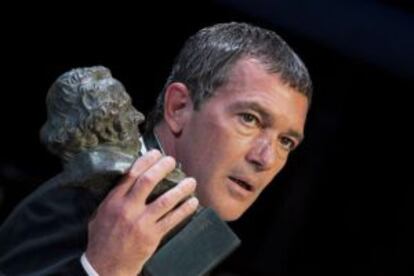The Goya Awards: four endless hours of “Spanish film fiesta”
Spain’s version of the Academy Awards needs to fix several major issues


The Spanish movie industry celebrated the 29th Goya Awards ceremony on Saturday, with nearly four hours of live TV coverage that seemed like it would never end.
Apparently, nearly three decades of experience is not enough for organizers to realize that this is simply too long for a televised gala show, even if the show in question is Spain’s equivalent of the Oscars.
The ceremony over-ran its programmed schedule by nearly an hour, despite the fact that host Dani Rovira – the male star of last year’s box-office sensation Ocho apellidos vascos – had warned the winners that they only had a minute to thank their families, friends, colleagues and pets.
And then, at 1am, when people were hoping to finally find out who would scoop the main prizes, singer Miguel Poveda stepped out on stage to regale his audience with a mini-concert. Was that really necessary?
The Spanish Film Academy and state broadcaster TVE still need to iron out some issues in a ceremony that has more downsides than upsides. Some performances, such as that of comedian Alex O’Dogherty, were an anticlimax; as was the self-promotional spot about the future of film, which probably made more viewers scream out in horror than want to rush to movie theaters.
Adding to the slow pace and interminable duration were the (by now classic) technical mistakes, such as shots of the floor and other parts of the auditorium that definitely should not have been shown.
One of the most shameful moments of the evening took place early on when the stars of the show were ambling down the red carpet. Referring to actress Juana Acosta, commentator Jesús María Montes-Fernández, a fashion expert, remarked: “She is Colombian but very beautiful, she looks Spanish.” He then kept going as though nothing had happened. If this is the kind of deep thought we can expect to hear on public television, they might as well drop the commentary entirely and let us watch in silence.

But it is only fair to admit that it wasn’t all bad. Moving the ceremony to Saturday, instead of the usual Sunday, was a good idea. The TV audience rose to 3.34 million people, higher than last year, as a reflection of that. It was also smart to hire Dani Rovira as the host, and not just because he was the man of 2014, but because he has a lot of experience as a stand-up comedian, which served him well on the Goya stage.
Rovira did everything he could to keep the audience interested – at one point he called Culture Minister José Ignacio Wert by the familiar diminutive “Nacho,” and he even attempted some tap dancing. But no matter how hard Rovira tried, there is simply no amount of jokes that can counter four hours of acceptance speeches.
In short, the “fiesta of Spanish film,” as the event is often referred to, still needs to make some significant improvements to its production, technical aspects and even content if it wants a real future as a televised show.
The night’s winners
The big winner of this year's Goya Awards was La isla mínima (or, Marshland), a Andalusia-set crime thriller directed by Alberto Rodríguez (7 Virgins, Unit 7) which scooped 10 prizes at Saturday's ceremony.
The movie took both Best Film and Best Director, as well as Best Actor for Javier Gutiérrez, and Best Female Newcomer, for Nerea Barros.
The Best Actress prize went to Bárbara Lennie, for her role in Magical Girl – the only award given to the second film from director Carlos Vermut, a thriller that follows a father's attempts to grant his dying daughter's final wish.
There was also plenty of screen time for the stars of Ocho apellidos vascos, officially the most successful Spanish film of all time thanks to its record €56 million haul at the national box office. Its three awards candidates all took home their statuettes: Karra Elejalde won Best Supporting Actor, Carmen Machi scooped Best Supporting Actress and the host of the evening's ceremony, Dani Rovira, was named Best Male Newcomer.
Of the other main candidates, Luis Tosar-starring crime thriller El Niño took four awards (Best Production, Best Sound, Best Original Song, Best Special Effects); animated comedy Mortadelo y Filemón contra Jimmy el Cachondo took two (Best Animation, Best Adapted Screenplay); and Relatos Salvajes (or, Wild Tales) walked away with one (Best Ibero-American Film). Best Documentary went to Paco de Lucía, which charts the life of the legendary flamenco musician.
One of the highlights of the night was the special award given to actor Antonio Banderas, who, at the age of 55, became the youngest ever recipient of an Honorary Goya award for his film career. An emotional Banderas, who received the statuette from long-term collaborator Pedro Almodóvar, ended his speech by stating: "The second part of my life begins here."
Tu suscripción se está usando en otro dispositivo
¿Quieres añadir otro usuario a tu suscripción?
Si continúas leyendo en este dispositivo, no se podrá leer en el otro.
FlechaTu suscripción se está usando en otro dispositivo y solo puedes acceder a EL PAÍS desde un dispositivo a la vez.
Si quieres compartir tu cuenta, cambia tu suscripción a la modalidad Premium, así podrás añadir otro usuario. Cada uno accederá con su propia cuenta de email, lo que os permitirá personalizar vuestra experiencia en EL PAÍS.
En el caso de no saber quién está usando tu cuenta, te recomendamos cambiar tu contraseña aquí.
Si decides continuar compartiendo tu cuenta, este mensaje se mostrará en tu dispositivo y en el de la otra persona que está usando tu cuenta de forma indefinida, afectando a tu experiencia de lectura. Puedes consultar aquí los términos y condiciones de la suscripción digital.








































